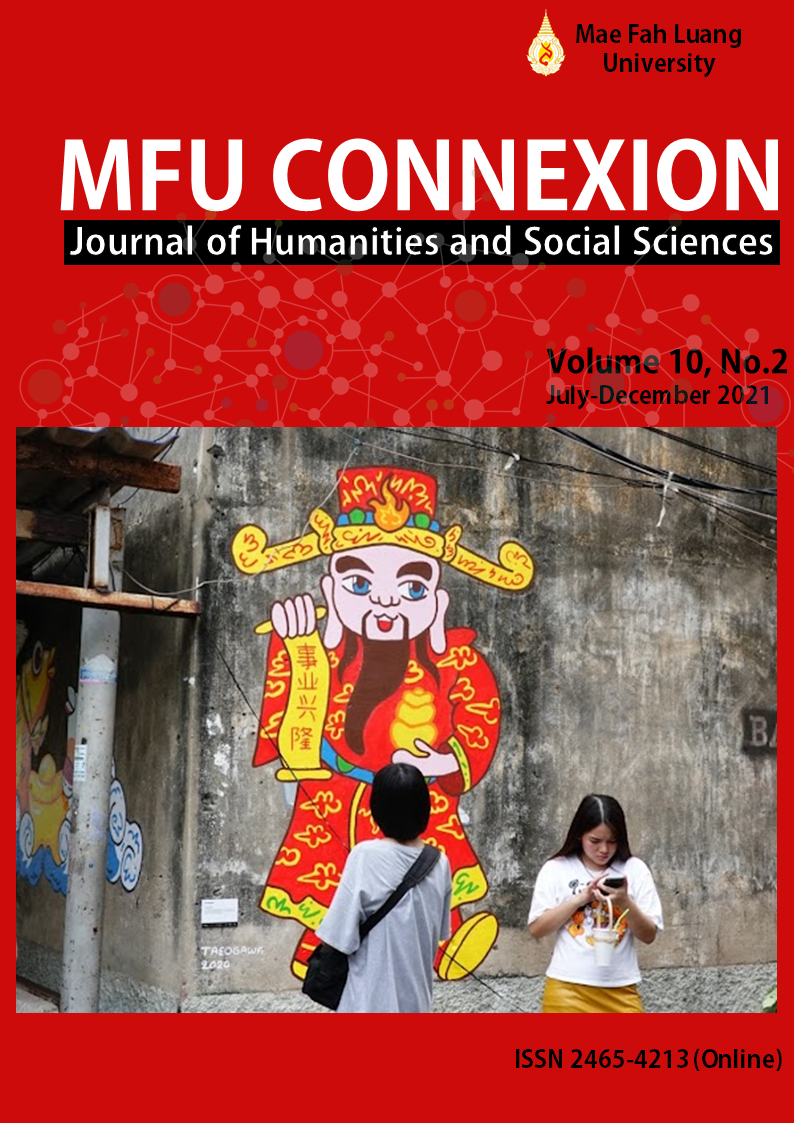The Transitional of China's “Soft Power” to “Sharp Power” Policy in the 21st Century
Main Article Content
Abstract
The purpose of this study is to examine the transition of China's soft power policy to sharp power. How does China's transition from soft power to sharp power affect cooperation between China and countries that cooperate with or are supported by China in the political, economic, trade, and investment fields? And how does it affect the expansion of China's influence and good image?
The study shows that an increase in superior bargaining power in business, politics, and military, combined with a desire to become one of the world's great powers. China's earlier use of soft power, emphasizing "persuasion," has changed to the use of power with more conditions and coercion, known as "sharp power." From the beginning, China will focus on building a good image and promoting cooperation by spreading Chinese language and culture through the Confucius Institute and the media. Chinese enterprises will be encouraged to invest abroad in line with the “Belt and Road” Initiative through investment and financial support from the Chinese government. This will include increased efforts to buy and invest in foreign media companies to influence and distort negative Chinese information and project a positive image of China. Through this method, they are all hidden with advantageous conditions, coercion and perversion. Ultimately, this important process is to adjust the image, create cooperation and influence the economy to dominate politics.
Article Details

This work is licensed under a Creative Commons Attribution-NonCommercial-NoDerivatives 4.0 International License.
Copyright
Connexion: Journal of Humanities and Social Sciences has an exclusive right to publish the accepted articles in any form. However, the author retains the following rights:
1. The right to the ownership of the article;
2. The right to use all or part of the article in his/her other works;
3. The right to re-produce the article for personal use or for use in the author’s organisation, in which case the author must obtain permission from Connexion: Journal of Humanities and Social Sciences;
4. The right to make copies of all or part of the work for educational use or for the author’s use in classroom teaching; and
5. The right to include the work (both the preprinted and printed versions) in an institutional repository.
References
Hanouna, S., Neu, O., Pardo, S., Tsur, O., & Zahavi, H. (2019) Sharp power in social media: Patterns from datasets across, Australian and New Zealand Journal of European Studie, vol. 11, no. 3, pp. 97-113.
IPD Forum. (2019, 22 April) The rise of sharp power (การเพิ่มขึ้นของอำนาจที่แหลมคม), Available: https://ipdefenseforum.com/th/2019/04/%E0%B8%81%E0%B8%B2%E0%B8%A3%E0%B9%80%E0%B8%9E%E0%B8%B4%E0%B9%88%E0%B8%A1%E0%B8%82%E0%B8%B6%E0%B9%89%E0%B8%99%E0%B8%82%E0%B8%AD%E0%B8%87-%E0%B8%AD%E0%B8%B3%E0%B8%99%E0%B8%B2%E0%B8%88%E0%B8%97%E0%B8%B5/ [16 Feburay 2020] (in Thai)
IPD Forum. (2019, 11 November) Conceptualization with ropaganda (การเผยแพร่แนวคิด ด้วยโฆษณาชวนเชื่อ), Available: https://ipdefenseforum.com/th/2019/11/%E0%B8%81%E0%B8%B2%E0%B8%A3%E0%B9%80%E0%B8%9C%E0%B8%A2%E0%B9%81%E0%B8%9E%E0%B8%A3%E0%B9%88%E0%B9%81%E0%B8%99%E0%B8%A7%E0%B8%84%E0%B8%B4%E0%B8%94-%E0%B8%94%E0%B9%89%E0%B8%A7%E0%B8%A2%E0%B9%82%E0%B8%86/ [1 May 2020] (in Thai)
Johns Hopkins University SAIS China-Africa Research Initiative. (2021) Chinese investment in Africa, Available: http://www.sais-cari.org/chinese-investment-in-africa [7 October 2021]
Ludwig, C. W. (2017, November 16) The meaning of sharp power: How authoritarian states project influence, Available: https://www.foreignaffairs.com/articles/china/2017-11-16/meaning-sharp-power [12 November 2020]
Lukes, S. (1974) Power: A radical view, London: Macmillan.
Mcclory, J. (2019) The soft power 30: A global ranking of soft power 2019, Portland: USC Center on Public Diplomacy.
Mead, W. R. (2009, October 29) America’s sticky power, Available: https://foreignpolicy.com/2009/10/29/americas-sticky-power/ [25 December 2020]
MGR Online. (2019, March 25) Reporters without borders warns China is using "New World Media Order" suppresses criticism (องค์กรนักข่าวไร้พรมแดนเตือนจีนกำลังใช้ “ระเบียบสื่อโลกใหม่” ยับยั้งเสียงวิจารณ์), Available: https://mgronline.com/around/detail/9620000029793 [24 January 2020] (in Thai)
Nye, J. S. (2004) Soft power: The means to success in world politics, New York: Public Affairs.
Olewe, D. (2021, May 3) Why African States support China against the West on Uighurs issue (ทำไมชาติในแอฟริกาสนับสนุนจีนต้านชาติตะวันตกเรื่องชาวอุยกูร์), Available: https://www.bbc.com/thai/international-56963682 [24 April 2021] (in Thai)
Parichat, C. (2019, November 28) The power of friendship! China overtakes the US, Establish an embassy and consulate the most in the world (พลังแห่งมิตรภาพ! จีนแซงหน้าสหรัฐตั้งสถานทูต-กงสุล เยอะที่สุดในโลก), Available: https://brandinside.asia/diplomacy-network-of-china-surpass-america/ [16 Febuary 2020] (in Thai)
Sahlins, M. (2015) Confucius institute: Academic malware, Chicago, IL: Prickly Paradigm Press.
Shao, J. (2019) Exploring China’s “Sharp Power”: Conceptual deficiencies and alternatives, Transcommunication, Tokyo, vol. 6, no. 2, pp. 129-148.
Singh, M. (2018) From smart power to sharp power: How China promotes her national interests, Journal of Defence Studies, vol. 12, no. 3, pp. 5-25.
Walker, C. (2018) “What is ‘sharp power’?”, Journal of Democracy, vol. 29, no. 3, pp. 9-23.
Young, R. A. (1978) Reviewed work: Power: A radical view by Steven Lukes, Canadian Journal of Political Science, vol. 11, no. 3, pp. 639-649.
Post Today. (2019, December 24) Belgium closes Confucius Institute China is believed to be used as a base for spying (เบลเยียมปิดสถาบันขงจื่อ เชื่อจีนใช้เป็นฐานสปายสอดแนม), Available: https://www.posttoday.com/world/609185?utm_source=posttoday.com&utm_medium=article_relate_inread&utm_campaign=new%20article [11 September 2020] (in Thai)
Post Today. (2020, 2 September) Pompeo plans to close Chinese Confucius Institutions across the US (พอมเพโอเล็งปิดสถาบันขงจื่อของจีนทั่วสหรัฐ), Available: https://www.posttoday.com/world/632099 [8 November 2020] (in Thai)
Kantalak. (2012) Soft power based on the concept of Joseph Nye (Soft power ตามแนวความคิดของ Joseph Nye), Naval Strategic Studies Journal, vol. 84, pp. 34-38.
Kruarattikan, S. (2008, 11 December) The concept of soft power and public diplomacy (แนวคิดเรื่อง soft power และการทูตสาธารณะ (public diplomacy)), Available: http://kositthiphon.blogspot.com/2008/12/soft-power-public-diplomacy.html [7 October 2021] (in Thai)
Thaninphongphak, C. (2020, 9 December) Why 'China' chooses to invest in 'Africa'? (ทำไม 'จีน' จึงเลือกลงทุนใน 'แอฟริกา'), Avaliable: https://forbesthailand.com/world/global-world/%E0%B8%97%E0%B8%B3%E0%B9%84%E0%B8%A1-%E0%B8%88%E0%B8%B5%E0%B8%99-%E0%B8%88%E0%B8%B6%E0%B8%87%E0%B9%80%E0%B8%A5%E0%B8%B7%E0%B8%AD%E0%B8%81%E0%B8%A5%E0%B8%87%E0%B8%97%E0%B8%B8%E0%B8%99%E0%B9%83.html [17 January 2021] (in Thai)
Tekasuk, P. (2018) From soft power to sharp power: When China’s diplomatic strategy mutates (จาก soft power ถึง sharp power: เมื่อยุทธศาสตร์การทูตของจีนกลายพันธุ์), Available: https://waymagazine.org/soft-power-sharp-power/ [20 December 2020] (in Thai)
Manassurakul, S. (2020) Confucius Institute quiet influence China? (‘สถาบันขงจื่อ’ ซุ่มเงียบแผ่อิทธิพลจีน?), Available: https://themomentum.co/confucius-institutes/ [25 December 2020] (in Thai)
Manochanphen, P. (2020, September 16) The image and confidence scores of the country's leaders on the world stage (ภาพลักษณ์และคะแนนความเชื่อมั่นต่อผู้นำประเทศในเวทีโลก), Available: https://thestandard.co/political-leaders-pew-research-center/ [11 August 2020] (in Thai)
Rueangrattanakorn, A. (2016) China-Africa relations: The case of China’s arms-for-oil and sudan’s oil-for-arms (ความสัมพันธ์ระหว่างจีนกับแอฟริกา: กรณีศึกษาการค้าอาวุธและน้ำมันระหว่างจีนกับซูดาน), Journal of Humanities and Social Sciences Thonburi University, vol. 10, no. 22, pp. 111-127. (in Thai)
Saengtien, P. (2015) China’s maritime silk road strategy: Implications for ASEAN & Southeast Asia (ยุทธศาสตร์เส้นทางสายไหมทางทะเลของจีน: ความเกี่ยวข้องต่ออาเซียนและเอเชียตะวันออกเฉียงใต้), The National Defence College of Thailand Journal, vol. 57, no. 3, pp. 49-61. (in Thai)


